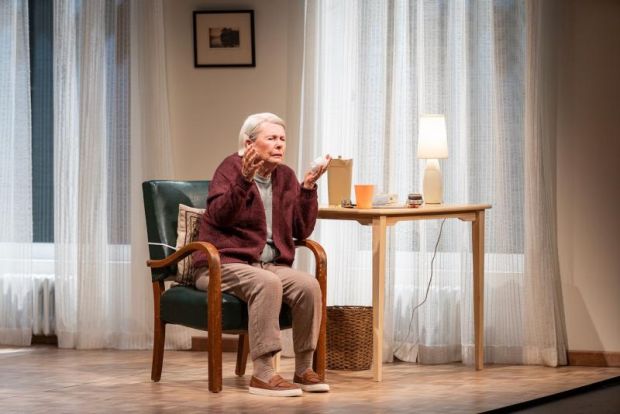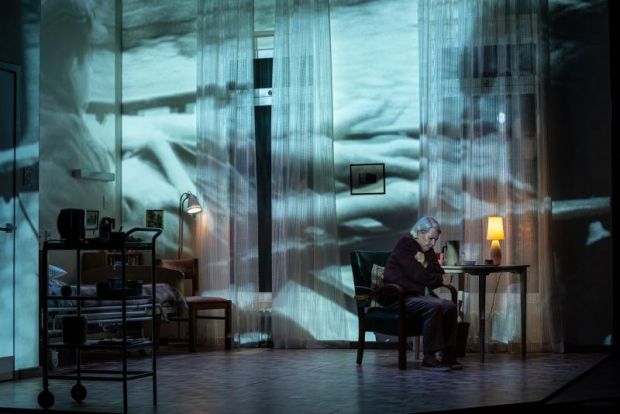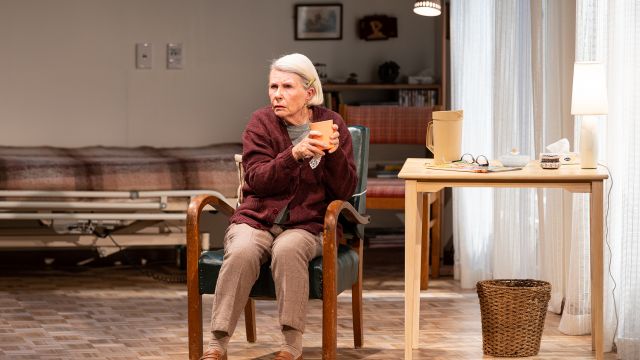A German Life
As a young woman in the mid-1930s, the naive and apolitical Brunhilde Pomsel found herself seconded to the Department of Propaganda to work as a secretary for Joseph Goebbels. She went on to live to 106 and was one of the last people alive who had been with the Nazi elite right up until the end. Based on many hours of interviews conducted in 2012 for a documentary, Christopher Hampton’s play accurately captures her voice—intelligent, pragmatic, articulate and resourceful. She was also ordinary and not evil. She had Jewish friends. Her father had Jewish clients. She didn’t hate these people but watched them disappear without ever questioning her job, let alone try to help. Was it self-deception? Innate trust of authority? The power of propaganda?

Under Armfield’s direction, Robyn Nevin has created Brunhilde with superb precision. Brunhilde’s joints may be stiffened with arthritis but she is always moving and clearly determined to be self-sufficient as far as she is able. Her slow and painful stoop to pick up a dropped tissue, and her fastidiousness in slowly and painfully wrapping a grape seed in a tissue before throwing it in a bin and then gingerly shuffling to a chair before settling on it lopsidedly, show a woman determined to stay dignified and in control as far as possible.

“We did not know,” Brunhilde claims. “The German people were guilty of stupidity.” Right inside Goebbels’ propaganda machine, did she really not know that the concentration camps were where people were murdered? Or could she not let herself know? Was it a protective mental block? Periodically in her story, Brunhilde comes to what is clearly distressing emotion, and then she falls into silence, holding her head and closing her eyes. At this point film projections illustrating the subject she’d been talking about appear on the walls of the room as though they were a flood of traumatic memory. It is a sympathetic portrait and the audience does feel for her.
This design is meticulously crafted. Not trusting the idiosyncrasies of different theatres, the team has brought their own lighting rig to ensure not a beam is out of place. The effect is an exquisite realism: the room is constantly and extremely subtly changing mood via lighting through the net curtains, sometimes becoming duller as presumably clouds pass, later illuminating Brunhilde’s face with direct harsher light as the afternoon draws on. The set is a lovingly recreated nursing home room which anyone with a loved one in aged care will immediately recognise. The sound design and music are no less flawless, with Catherine Finnis’ solo cello amplifying the sombre and intense mood.

Perhaps this isn’t a new story, but it is worthwhile to be reminded of how everyday people are drawn into evil, especially now that literal Nazism is regaining popularity. Neil Armfield and Robyn Nevin are theatre aristocracy needing no introduction, and this play lives up to their reputation. This play is nothing short of sheer perfection.
Cathy Bannister
Photographer: Andrew Beveridge
Subscribe to our E-Newsletter, buy our latest print edition or find a Performing Arts book at Book Nook.

